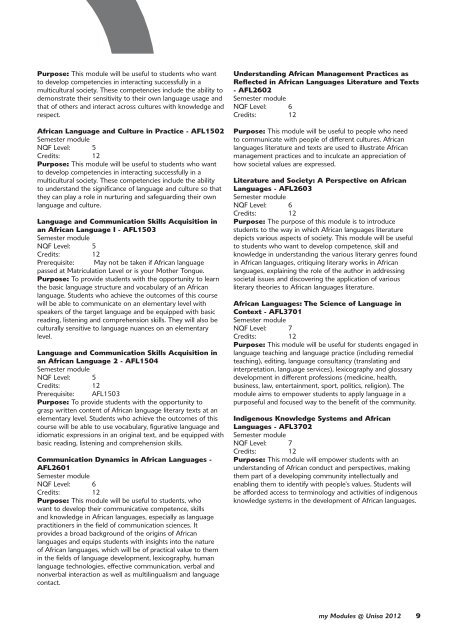my Modules @ Unisa - University of South Africa
my Modules @ Unisa - University of South Africa
my Modules @ Unisa - University of South Africa
Create successful ePaper yourself
Turn your PDF publications into a flip-book with our unique Google optimized e-Paper software.
Purpose: This module will be useful to students who want<br />
to develop competencies in interacting successfully in a<br />
multicultural society. These competencies include the ability to<br />
demonstrate their sensitivity to their own language usage and<br />
that <strong>of</strong> others and interact across cultures with knowledge and<br />
respect.<br />
<strong>Africa</strong>n Language and Culture in Practice - AFL1502<br />
Semester module<br />
NQF Level: 5<br />
Credits: 12<br />
Purpose: This module will be useful to students who want<br />
to develop competencies in interacting successfully in a<br />
multicultural society. These competencies include the ability<br />
to understand the significance <strong>of</strong> language and culture so that<br />
they can play a role in nurturing and safeguarding their own<br />
language and culture.<br />
Language and Communication Skills Acquisition in<br />
an <strong>Africa</strong>n Language I - AFL1503<br />
Semester module<br />
NQF Level: 5<br />
Credits: 12<br />
Prerequisite: May not be taken if <strong>Africa</strong>n language<br />
passed at Matriculation Level or is your Mother Tongue.<br />
Purpose: To provide students with the opportunity to learn<br />
the basic language structure and vocabulary <strong>of</strong> an <strong>Africa</strong>n<br />
language. Students who achieve the outcomes <strong>of</strong> this course<br />
will be able to communicate on an elementary level with<br />
speakers <strong>of</strong> the target language and be equipped with basic<br />
reading, listening and comprehension skills. They will also be<br />
culturally sensitive to language nuances on an elementary<br />
level.<br />
Language and Communication Skills Acquisition in<br />
an <strong>Africa</strong>n Language 2 - AFL1504<br />
Semester module<br />
NQF Level: 5<br />
Credits: 12<br />
Prerequisite: AFL1503<br />
Purpose: To provide students with the opportunity to<br />
grasp written content <strong>of</strong> <strong>Africa</strong>n language literary texts at an<br />
elementary level. Students who achieve the outcomes <strong>of</strong> this<br />
course will be able to use vocabulary, figurative language and<br />
idiomatic expressions in an original text, and be equipped with<br />
basic reading, listening and comprehension skills.<br />
Communication Dynamics in <strong>Africa</strong>n Languages -<br />
AFL2601<br />
Semester module<br />
NQF Level: 6<br />
Credits: 12<br />
Purpose: This module will be useful to students, who<br />
want to develop their communicative competence, skills<br />
and knowledge in <strong>Africa</strong>n languages, especially as language<br />
practitioners in the field <strong>of</strong> communication sciences. It<br />
provides a broad background <strong>of</strong> the origins <strong>of</strong> <strong>Africa</strong>n<br />
languages and equips students with insights into the nature<br />
<strong>of</strong> <strong>Africa</strong>n languages, which will be <strong>of</strong> practical value to them<br />
in the fields <strong>of</strong> language development, lexicography, human<br />
language technologies, effective communication, verbal and<br />
nonverbal interaction as well as multilingualism and language<br />
contact.<br />
Understanding <strong>Africa</strong>n Management Practices as<br />
Reflected in <strong>Africa</strong>n Languages Literature and Texts<br />
- AFL2602<br />
Semester module<br />
NQF Level: 6<br />
Credits: 12<br />
Purpose: This module will be useful to people who need<br />
to communicate with people <strong>of</strong> different cultures. <strong>Africa</strong>n<br />
languages literature and texts are used to illustrate <strong>Africa</strong>n<br />
management practices and to inculcate an appreciation <strong>of</strong><br />
how societal values are expressed.<br />
Literature and Society: A Perspective on <strong>Africa</strong>n<br />
Languages - AFL2603<br />
Semester module<br />
NQF Level: 6<br />
Credits: 12<br />
Purpose: The purpose <strong>of</strong> this module is to introduce<br />
students to the way in which <strong>Africa</strong>n languages literature<br />
depicts various aspects <strong>of</strong> society. This module will be useful<br />
to students who want to develop competence, skill and<br />
knowledge in understanding the various literary genres found<br />
in <strong>Africa</strong>n languages, critiquing literary works in <strong>Africa</strong>n<br />
languages, explaining the role <strong>of</strong> the author in addressing<br />
societal issues and discovering the application <strong>of</strong> various<br />
literary theories to <strong>Africa</strong>n languages literature.<br />
<strong>Africa</strong>n Languages: The Science <strong>of</strong> Language in<br />
Context - AFL3701<br />
Semester module<br />
NQF Level: 7<br />
Credits: 12<br />
Purpose: This module will be useful for students engaged in<br />
language teaching and language practice (including remedial<br />
teaching), editing, language consultancy (translating and<br />
interpretation, language services), lexicography and glossary<br />
development in different pr<strong>of</strong>essions (medicine, health,<br />
business, law, entertainment, sport, politics, religion). The<br />
module aims to empower students to apply language in a<br />
purposeful and focused way to the benefit <strong>of</strong> the community.<br />
Indigenous Knowledge Systems and <strong>Africa</strong>n<br />
Languages - AFL3702<br />
Semester module<br />
NQF Level: 7<br />
Credits: 12<br />
Purpose: This module will empower students with an<br />
understanding <strong>of</strong> <strong>Africa</strong>n conduct and perspectives, making<br />
them part <strong>of</strong> a developing community intellectually and<br />
enabling them to identify with people’s values. Students will<br />
be afforded access to terminology and activities <strong>of</strong> indigenous<br />
knowledge systems in the development <strong>of</strong> <strong>Africa</strong>n languages.<br />
<strong>my</strong> <strong>Modules</strong> @ <strong>Unisa</strong> 2012 9
















